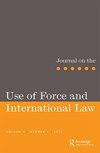不断变化的不干涉内战法——评估2011年后国家实践中合法性的产生
Q3 Social Sciences
Journal on the Use of Force and International Law
Pub Date : 2018-01-02
DOI:10.1080/20531702.2018.1431457
引用次数: 3
摘要
特别是自“阿拉伯之春”开始以来,在不友好但合法的干预和非法干预之间划清界限变得越来越困难。本文认为,在正式层面上,决定习惯法形成和变化的基本参数同样不精确,这一事实是不干预的实质含混不清的一个根本原因。目前的国家实践表明,国家不是单独区分法律推理和法外推理,而是根据所讨论问题的政治、道德或战略相关性使用一系列推理。本文建议如何在不引发更多争议的情况下,对无法归类于现有类别的政府行为进行处理。重点应该放在国家行为的次级曲调上,因为它实际上是国家用来测试、重新制定或最终拒绝潜在的新法律论据的中间阶段。本文章由计算机程序翻译,如有差异,请以英文原文为准。
The changing law of non-intervention in civil wars – assessing the production of legality in state practice after 2011
ABSTRACT It is, especially since the beginning of the ‘Arab Spring’, increasingly difficult satisfactorily to draw the line between an unfriendly but legal interference and an unlawful intervention. This article identifies as one root cause for the material vagueness of non-intervention the fact that on the formal level, the underlying parameters determining the formation and change of customary law are equally imprecise. Current state practice shows that, rather than solely distinguishing between legal and extralegal reasoning, states use a spectrum of reasoning adjusted to the political, moral or strategic relevance of the issue in question. This article suggests how to deal with governmental behaviour that cannot be classified within the existing categories without provoking even more controversies. Emphasis should be placed on the sub-tunes of state behaviour as it is, in fact, this in-between stage that states use to test, reformulate or ultimately reject what is potentially a new legal argument.
求助全文
通过发布文献求助,成功后即可免费获取论文全文。
去求助
来源期刊

Journal on the Use of Force and International Law
Social Sciences-Law
CiteScore
1.10
自引率
0.00%
发文量
13
 求助内容:
求助内容: 应助结果提醒方式:
应助结果提醒方式:


